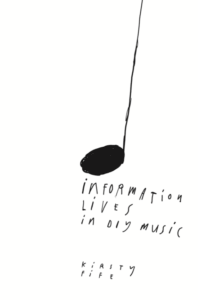Information Lives In DIY Music
Author: Kirsty Fife
Price: $60
Published: July 2025
ISBN: 978-1-63400-145-8
308 pages
Within the last decade, the heritage of music subcultures has been a focus of exhibitions,
programming, and collecting initiatives undertaken by national institutions including the
British Library and Museum of London. These activities have succeeded in attracting large
audience numbers and diversifying museum visitor profiles, cementing the position of
popular music within museum holdings. However, as museums profit from representation
of these histories, grassroots music communities actively struggle to survive in the
face of issues, including the regular closure of music venues, the impact of gentrification and
the housing crisis, cuts to cultural funding, and the declining value of recorded music in the
streaming era.
Beginning within these communities at this point of crisis, Information Lives in DIY Music
examines the role of information and heritage in UK-based DIY music communities through
the framework of critical information studies. The first part of the book explores the impact
of institutional historicisation and archiving on DIY music community members, then
proceeds to identify and examine the grassroots information and archival practices which
underpin these communities. Finally, the book considers how information and records
created by currently active communities are affected by socioeconomic, cultural and
technological developments in the 21 st century.
Kirsty Fife (they/them) is an academic, archivist and a member of UK DIY cultures. They
currently work as Lecturer in Digital Information and Curatorial Practice at Manchester
Metropolitan University’s iSchool. In 2022 they completed a PhD at UCL’s Department of
Information Studies, an adapted version of which is being published as this book! Prior to
their PhD they worked as an archivist in the UK archive sector, working as an outreach
specialist and project manager for organisations including Hoxton Hall, Parliamentary
Archives and the National Science and Media Museum. Outside of research and professional
work, they make zines and shambolic punk music, and build community in DIY cultural
networks.
